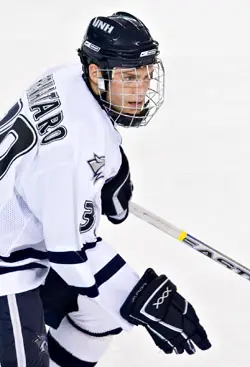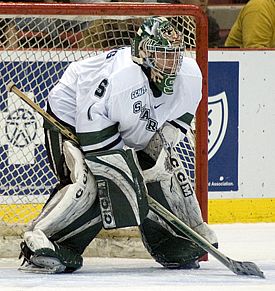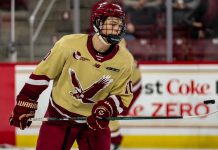As it did last year, the West Regional looks to house the toughest quarter of the NCAA bracket. Two regular-season conference champions (one of them the host team), the defending NCAA titlists and a dangerous No. 4 seed make for what should be a highly-entertaining and potentially unpredictable weekend of hockey.
The nominal top seed is New Hampshire, but host Colorado College can reasonably be deemed the co-favorite — if not more — in this ultra-competitive regional.
Both UNH and CC will be looking for redemption after losing in last weekend’s conference tournaments after coming in as top seeds, but the experience was worse for CC, which lost twice at the WCHA Final Five, including Saturday to North Dakota in a game which settled the race for the final No. 1 seed in the NCAA tourney.
The underdog role suits Notre Dame, which plays New Hampshire in the semifinals Friday, just fine. The Fighting Irish reached the NCAA tournament by the narrowest of margins after a two-loss weekend in Detroit, but are in the nationals for the second straight year nonetheless.
And then there’s third-seeded Michigan State, which finds itself in a situation similar to last year: not even favored in its first game of the tournament, especially with a true road game this time around.
We all remember how 2006-07 ended, of course.
New Hampshire vs. Notre Dame
Friday, 4:30 p.m. MT, World Arena, Colorado Springs, Colo.
New Hampshire Wildcats
Record: 25-9-3, 19-5-3 Hockey East (first)
Seed: No. 4 overall, No. 1 West
How in: At-large
2007 NCAA tournament: Lost in regional semifinal
With the top two overall seeds, Michigan and Miami, being sent to regions where they wouldn’t have to face a team playing on its home ice (Wisconsin and Colorado College), UNH drew that unenviable lot. Making matters worse, the devoted Wildcat faithful now must travel to the single most distant venue.

“It is what it is,” UNH coach Dick Umile says. “We’re the number-one seed and that’s where we’re going. You can’t waste any energy on it. Obviously the tough part is that we’ve got a great following and there’s going to be a good portion of our fans that won’t be able to travel out to Colorado Springs. But that being said, we’re excited to be heading out there.”
On the plus side, the Wildcats will be playing on an Olympic sheet, making them feel at least a bit at home. They also experienced the facility first-hand last season in the front-end of a two-year, four-game home-and-home series with Colorado College.
“If we were someone that didn’t play on that size sheet it could be a concern,” Umile says. “Obviously that’s not the case for us and we’re familiar with the arena.”
UNH will be looking to regain the momentum it carried into the Hockey East semifinals, where it lost to Boston College in triple overtime. Prior to that, the Wildcats had dropped only a single league game since early December.
“The loss was a missed opportunity,” Umile says. “It’s over. It’s done with. Now it’s all about playing good hockey, getting some bounces and staying healthy.”
Those watching UNH for the first time this year will see Hockey East’s top defensive club, led by the league’s unanimous Player of the Year, goaltender Kevin Regan.
“He’s broken all kinds of records here at UNH and we’ve had a tradition of great goaltenders,” Umile says. “There’s no question that he’s the backbone of our team defense.”
Seniors Brad Flaishans and Craig Switzer lead a veteran group of blueliners.
“Five of our six defensemen were back from the previous year so it’s an experienced group,” Umile says. “Our whole team is committed to playing defense when we don’t have the puck.”
Up front, Matt Fornataro (18-28–46) and Mike Radja (19-24–43) join with Danny Dries to form an imposing first line, but there’s not much of a dropoff when number-two NHL draft pick James vanRiemsdyk, Jerry Pollastrone and Bobby Butler take the ice.
“We’ve developed a good lineup as far as spreading the scoring out,” Umile says. “Our first line has proven all season that they’re very skilled, they can score goals and they can create offense. Their line has been fairly consistent all season. Our second line has goalscorers, too, so there’s some good balance in those two lines.
“Our third line is a great forechecking line. They’re not the finishers that our other lines might be, but they generate a lot of scoring chances just with their forechecking and cycling. Even our fourth line is a very, very skilled group.
“That gives us four lines that can create offense, that can score goals, but know that they need to play defensively first.”
Arguably, UNH’s matchup with Notre Dame pits two terrific defensive clubs with the Wildcats’ scoring prowess the expected difference.
“[Notre Dame coach] Jeff Jackson’s teams can slow offenses down,” Umile says. “That’s always been the case. Jeff is one of the great college coaches. Defense and penalty kill are his fortes.
“They play off the puck defensively extremely well. They may not generate the shots that some of the other teams do, but their style of play is very disciplined, very controlled. You’re going to have to win some one-on-one battles if you’re going to be successful against Notre Dame.”
Notre Dame Fighting Irish
Record: 24-15-4, 15-9-4 CCHA (fourth)
Seed: No. 13 overall, No. 4 West
How in: At-large
2007 NCAA tournament: Lost in regional final
After losing a pair of 2-1 games in last weekend’s CCHA tournament, at least one thing became clear to Notre Dame head coach Jeff Jackson: “We’re going to have to find a way to score more than a goal.”
Jackson is taking his Fighting Irish to the NCAA tournament for the second year in a row in just his third year as head coach in South Bend, Ind., but what a different a year makes. Last year, the Irish took everyone by surprise by capturing both the CCHA regular-season and tournament championships with 32 wins overall, 21 in the CCHA. The Irish were the No. 1 seed in the 2007 Midwest Regional, losing that portion of the bracket to eventual national champion Michigan State.
This year, Notre Dame needed three games to finish off Ferris State in the second round of CCHA playoff action and have just four wins since Feb. 1 (4-6-3). And the games have gone as the scoring as gone; in that 13-game span, the Irish have scored just 25 goals, a total that includes a six-goal output in their second playoff game against Ferris State. During that span, Notre Dame has averaged 1.92 goals per game, and has been outscored by opponents 28-25.
ND’s top five returning scorers combined for 83 goals last season. This year, the same five have 57 between them. While the Irish have picked up scoring from freshman Ben Ryan (10-14–24) and junior Christian Hanson (10-8–18), the Irish offense hasn’t been the same since midseason, a shift in dynamics that Jackson said is “a number of things.”
“We were scoring close to four goals a game. We were in the top five in the country at Christmastime,” said Jackson. Then we had the schedule with some of the top teams in the country.”
The Irish went 1-5-1 in the first six games of the second half, with a split against resurgent Northern Michigan, a loss and a tie against Michigan State and two losses to Michigan. The Friday losses to MSU and UM were, according to Jackson, “heartbreaking.”
After tying the Spartans 1-1 in the second period Jan. 11, the Irish gave up the game-winning goal at 18:03 in the third in the 3-1 loss; after leading the Wolverines 2-0 going into the second Jan. 18, the Irish gave up two second-period goals and the game-winner in the 3-2 decision with just 21 seconds left in regulation.
“I think we lost our confidence,” said Jackson. “I’ve never seen a team go cold all like that at the same time.”
Adding to the offensive misery for ND is the loss for the season of junior Erik Condra (15-23–38), the Irish’s leading scorer.
If the Irish are to survive this bracket, they’ll do so on the defensive end. Notre Dame has the fourth-best defense in the country, giving up just 2.05 goals per game, and junior Jordan Pearce (.917 SV%, 1.94 GAA) looked phenomenal in Detroit.
“He’s like a freshman,” said Jackson of Pearce, who spent last year backing up Hobey Baker nominee David Brown. “It’s his first full year. He’s probably the reason, in the second half, why we did get into the tournament. He was under a lot of pressure — every time he gave up a goal, he knew we could lose the game because we weren’t scoring.”
Jackson said that the Irish are “just fortunate” to be heading to the tournament. “We go into it a little different than we were a year ago. I don’t mind being the underdog.
“I think that last year we anticipated and were expected to be in the tournament. This year we had to claw our way in. It’s the first time in our program’s history that we’ve gone back-to-back.”
As for the field the Irish are facing, Jackson said it’s “challenging,” but added, “The tournament we were just in had some pretty good teams, too.”
Colorado College vs. Michigan State
Friday, 8 p.m. MT, World Arena, Colorado Springs, Colo.
Colorado College Tigers
Record: 28-11-1, 21-6-1 WCHA (first)
Seed: No. 5 overall, No. 2 West
How in: At-large
2007 NCAA tournament: none
In a season when the WCHA was hard to predict, when teams went on hot and cold streaks, there were still a few constants and one was the Colorado College Tigers — they would win, especially at home.
The Tigers went 18-2 at home, including winning 14 straight at the World Arena before falling to St. Cloud State in early February. They were also consistent, getting a point every weekend save one — an early nonconference tilt at New Hampshire — a consistency that helped them earn the MacNaughton Cup as the league’s regular-season champions.
However, the Tigers have started to catch the inconsistency bug of late, struggling in their sweep of Alaska Anchorage to make the Final Five. Then, once in St. Paul, CC lost twice, failing once again to capture a Broadmoor Trophy and seeing their No. 1 seed for the NCAAs — once seemingly a lock — slip away.
“Our play has been a little inconsistent since we won up in Denver,” admitted head coach Scott Owens. “We won, we beat Denver 3-1, we swept Alaska Anchorage, but there were little pieces of inconsistency in those games. When we played North Dakota [and] Minnesota, the inconsistencies really came out.
“I think our guys are dialed in and ready to go. I think everybody knows what’s at stake and it’s a situation that hopefully we will be more consistent, that we’ll be prepared and ready to go.”
When consistent, the Tigers can be deadly. In early February, Owens put junior Chad Rau (28-14–42) on a line with sophomores Bill Sweatt (10-17–27) and Mike Testwuide (11-10–21) with great dividends. Rau has been the biggest beneficiary of the move, continuing to quietly make his mark as one of the great players in the WCHA.
“I think in some ways [Rau] gets overlooked a little bit. He’s our catalyst offensively and special teams and scoring,” said Owens, before backtracking a tad. “I don’t mean overlook — he was a first-team all-WCHA player, but people forget about what a fantastic year he’s had.”
Second to Rau on the score sheet and possibly one of the best defensemen in the country is Jack Hillen with 37 points (6g, 31a). However, if a team can get past Hillen, it then has to contend with the WCHA Rookie and Player of the Year in Richard Bachman (1.82 GAA, .933 sv%), who won the starting job from junior Drew O’Connell early in the season.
“The minutes he’s played and the results he’s had; he’s one of the youngest guys on our team but I don’t really consider him a freshman at this point,” said Owens. “I think he plays like an upperclassman anyway, but in particular the second half of the year.”
Now that Bachman’s been on the big stage — and performed admirably in his team’s losses — he his teammates now get to shine back at home, where Owens hopes his team will find its footing once again.
“It’s good to get back in our familiar surroundings, get back at the World Arena, the size sheet that we’ve had some success at,” said Owens. “We hadn’t been to St. Paul in a few years and I think it was a great learning experience even though we could not have success, but I think it’s good now to be back home and get ready for the regionals.”
The Tigers come back to the Springs riding a two-game losing streak, their second-longest of the season, but aren’t worried about the lack of momentum — even if Michigan State is also riding in on a similar skid.
“We’d had a pretty good run here, up until this weekend in St. Paul,” said Owens. “I don’t think it really hurts us, our confidence; I think it’ll get everybody’s attention and it may not be a bad thing.”
If it does grab the Tigers’ collective attention, they may get the chance to play near home once again up I-25 in Denver.
Michigan State Spartans
Record: 24-11-5, 19-6-3 CCHA (third)
Seed: No. 9 overall, No. 3 West
How in: At-large
2007 NCAA tournament: National champions
Last year, Michigan State finished fourth in the CCHA but first in the nation. This year, the Spartans were third in conference play, but sat out the league’s championship tournament in Detroit for the first time in 17 years, having lost a best-of-3 quarterfinal series to Northern Michigan on their own turf after securing a bye week for the first round of the playoffs.

“It was really hard, especially since we knew we were in the [NCAA] tournament,” said head coach Rick Comley, who watched last week’s tournament from the seats in Joe Louis Arena. “That was our second weekend in three off.”
Comley said that the Spartans knew why they were watching from East Lansing instead of dressing in Detroit. “Northern played great. We didn’t sit out with a bad taste in our mouth.”
But they did sit out, and that, said Comley, could be a problem. “It hurts. We tried all week to get it back. It was a struggle after the one week off. We never quite got it back. This week it’s been a struggle again. There’s a game sharpness that comes with playing. That’s why we play all season long, for that game sharpness and to prepare for the [NCAA] tournament.”
The defending national champs began the season on a low note, with a 6-0 loss to North Dakota in the U.S. Hockey Hall of Fame game, but followed that with a decisive eight-game win streak … before running into four games against three ranked teams — Miami, Minnesota, Wisconsin — a stretch through which they went 0-2-2.
That beginning was perhaps indicative of how this MSU team would fare for the rest of the season. Entering this weekend’s regional, the Spartans are 3-4-4 against participants in this 16-team field, with a 0-1-2 record against WCHA teams in the tourney. And in the CCHA playoffs, the Spartans faced a Northern Michigan team that had swept them on the road just weeks before and which finished up its season with two fewer CCHA wins than had MSU in the second half.
In the West regional, the Spartans “have a tough draw,” said Comley. “We play a very, very good team, on its home ice, on an Olympic sheet. We’re all thrilled to go [but] certainly there would be better places for us.”
The Spartans are 10th-best nationally in three categories coning into the tournament, offense (3.27 goals per game), power play (20.8 percent) and penalty kill (86.7 percent), and are 12th-best defensively (2.35 goals per game).
“I think this team’s had to deal all year with expectations this season,” said Comley. “The bottom line is that our team has not been as good as last year. We still won 24 games. It just never came together in the ways that I hoped it would.”
MSU is backstopped by a Hobey Baker finalist, junior Jeff Lerg (2.23 GAA, .925 SV%), who has proved himself a playoff goaltender with a 1.50 goals-against average and .950 save percentage in six NCAA tournament games in the past two years.
Even with Lerg in net, it’s defense that could be MSU’s downfall, said Comley. The Spartans do have six players with goal totals in the double digits, and are led offensively by junior Tim Kennedy (19-21–40), senior Bryan Lerg (20-18–38) and junior Justin Abdelkader (18-19–37), one of the best agitators in the game.
No one expected MSU to emerge from its regional last year, said Comley, so the Spartans are in familiar territory heading to Colorado.
“Last year’s last year,” said Comley. “This year’s this year. Both are great stories.”


